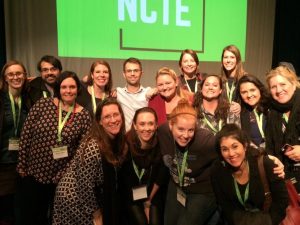Our Community
 We believe that a teacher’s best teacher is another teacher. Teachers are professionals who engage in ongoing professional development to revise their practice and be responsive to diverse students’ needs. Teachers always learn across extended lengths of time, from the resources that are available – so deliberate planning of conversations and experiences that are transformative over a long time allows them to reconsider and expand their teaching as it unfolds.
We believe that a teacher’s best teacher is another teacher. Teachers are professionals who engage in ongoing professional development to revise their practice and be responsive to diverse students’ needs. Teachers always learn across extended lengths of time, from the resources that are available – so deliberate planning of conversations and experiences that are transformative over a long time allows them to reconsider and expand their teaching as it unfolds.
As teachers of writing, we believe that a writing workshop classroom provides the best opportunities for students to engage in self-regulated work for authentic purposes. Writers learn to write through writing about topics that matter to them, for audiences who are waiting to hear what they have to say. In a classroom grounded in autonomy and authenticity, teachers plan responsive mini lessons and lead individualized conferences that guide students to learn from published authors, their teacher as a writer, and the writing community they form with their peers.

We have seen that not only writing itself, but also many of the goals of social-emotional learning can be achieved through this approach to the teaching of writing. Students learn to control their time and work habits, adapt to the challenges that extended work on projects presents, and engage with emotionally fulfilling purposes. Writing often involves aesthetic decisions – think about what is beautiful – and that kind of thinking can open up humanizing conversations among students. Writing – and helping one another with writing – creates community and shared purpose among a classroom. Writing forces a teacher and classroom to be open to multiple perspectives and the need for everyone to have a voice.
The teaching of writing, therefore, can become an excellent location for personal growth, social connection, moral and spiritual reflection, and democratic participation – as well as academic work in an important area of the school curriculum.
